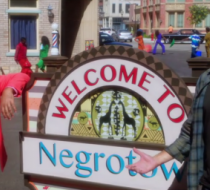Negrotown 1 Favorite
The video: https://www.youtube.com/watch?v=Rg58d8opQKA
From Flavorwire:
“Another world is possible!” — so goes the popular activist chant at rallies and marches. Yet one of the most difficult aspects of sustaining a grassroots political movement can be imagining that other world and persisting even when it seems far away.
Right now, the nation is gearing up for a what’s likely to be a spate of protests against police brutality. Called #Blackspring on social media, it promises a confrontation between the defenders of the status quo and those idealists hoping to make America a more just place. At a perfect moment, comedians Keegan-Michael Key and Jordan Peele are gearing up for a return to Comedy Central with a sketch that imagines that better place. Their short but brilliant “Negrotown” shows us, through fantasy, what it might look like if, to quote Amandla Sternberg, quoting a popular saying,“we loved black people as much as we loved black culture.”
The sketch starts and ends in reality, showing an innocent black man in the clutches of a clearly racist cop. The actors’ traditional theater background works to great effect; Key’s face is full of a genuine terror that reflects what we’ve seen in the streets in Baltimore and around the country. But then he’s transported magically by Peele’s character to a special land. Life in Negrotown is explained via a song-and-dance number, delivered as a pitch-perfect imitation of the golden era of American musical comedy — with a visual register that recalls The Wizard of Oz and Willie Wonka & the Chocolate Factory. The scene is complete with occasional spoken-word interruptions and multiple groups of singing, dancing extras, all entering in stages.
The thing about this utopia, as it’s described in the sketch, is that it doesn’t offer clichés like free ice-cream or endless sunshine. Rather, it simply exults in freedom, which arrives in the form of an absence of white aggression. There are no racial double standards, no white supremacy. Included in the list of Negrotown’s attributes is a respite from horrible and violent injustices, like getting shot for wearing a hoodie or harassed or beaten by cops, as well as everyday racist hassles— in this alternate reality, there are no awkward white people hair-touching, and there is an endless supply of cab drivers who are willing to pull over for black passengers.
Since the beginning of the year, a national coalition of protesters has been assembling an interactive online map of demands for Black Lives Matter protests throughout the country. Clicking around it shows that demands vary from city to city. In New York, the protesters are solely focused on police reform, while in other cities, education and anti-poverty initiatives share the docket. But beyond these specifics is the idea that there are concrete steps that can be taken, ideas for improvement beyond just raising awareness. Another world is possible.
Frequently, social justice movements get snagged when they accidentally replicate the world they’re trying to unmake, whether it’s through authoritarian leadership or more subtle race and gender dynamics that divide and drive away participants. Of course, if you can’t see beyond the system in which you’re currently operating, it can be difficult to continue the process of organizing when setbacks and crackdowns from the state or other authorities inevitably occur. That’s where the role of art, culture, and — particularly recently — comedy comes in. Artists, whether in popular or highbrow forms, can help use imagination and creativity to push beyond the boundaries of what’s previously existed in reality, drawing the borders of a different existence. If we’re laughing at a coach who exhorts his players not to rape, or a magical land without white supremacy, it’s because these ideas still seem absurd, but they don’t have to be.







